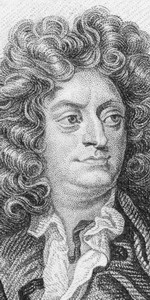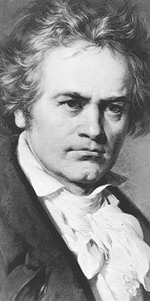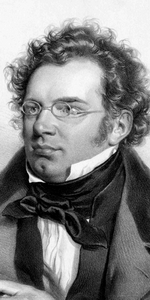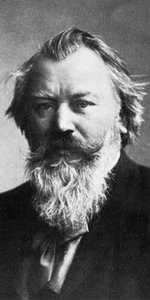





Henry Purcell, Ludwig van Beethoven, Franz Schubert & Johannes Brahms
I have a number of things in common with my beloved mother, two of which are: a love and facility with music and poetry. I had written her a couple of poems for her birthday in the past and had a mind to do so again. So I rang her and we discussed what such a poem would be about. Her love of classical music soon became the subject and I asked her to name her favourite pieces. Most of those are mentioned in the poem. Note that these are her choices not mine.
The poem is in the standard Martian sonnet form. You can read all about that in my sonnets on sonnets.
The world of music is a complex land,
With orchards full of fruit of every form,
And if banal simplicity's the norm,
There are yet trees whose crop is far less bland.
For those who fain1 pop music would eschew,
And flee the endless deeply thumping beat,
For whom something cerebral would be meet,
For them it's only classical will do.
And so although the music's rather old,
And only played by experts in the field,
And steeped in lore confusing and arcane.
Yet still it is a wonder to behold,
With many pleasures ready ripe to yield,
To stimulate the cortex of the brain.
There's many think Beethoven is the best,
And many love his symphony in A2,
His 14th string quartet3 is fine they say,
As good as his sonata "The Tempest"4.
While others push young Mozart to the fore,
For Don Giovanni's best is hard to top,
Le Nozze Di Figaro5 is no slop,
E chi lo sa che cosa è amor?6
And don't forget Scarlatti's keyboard work,
Nor Handel's "Silent Worship"7 which is loved,
And also The Nutcracker8 is divine.
They shine like stars short-glimpsed outside the mirk,
A guiding hand unshackled and ungloved,
A friend who stands to fill your glass with wine.
Sometimes it's only Brahms' work will do,
His symphony in F9 is rightly praised,
While art song10 was by Schubert stoutly raised,
And his Quintet in C11 a heady brew.
And then there's Bach's cantata number 412,
His Brandenberg concertos there as well,
And Dido and Aeneas13 from Purcell,
And Abdelazer's rondeau14 what is more.
The greatest hold no truck with tiny minds,
They will not break their vision for hard cash,
Nor force their concept in too small a mould.
This world is full of music of all kinds,
Of all between the humble and the flash,
But you must seek to find the stuff of gold.
Warren Mars - September 2020